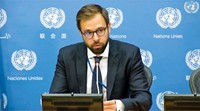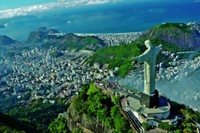Advertisement
Grab your lab coat. Let's get started
Welcome!
Welcome!
Create an account below to get 6 C&EN articles per month, receive newsletters and more - all free.
It seems this is your first time logging in online. Please enter the following information to continue.
As an ACS member you automatically get access to this site. All we need is few more details to create your reading experience.
Not you? Sign in with a different account.
Not you? Sign in with a different account.
ERROR 1
ERROR 1
ERROR 2
ERROR 2
ERROR 2
ERROR 2
ERROR 2
Password and Confirm password must match.
If you have an ACS member number, please enter it here so we can link this account to your membership. (optional)
ERROR 2
ACS values your privacy. By submitting your information, you are gaining access to C&EN and subscribing to our weekly newsletter. We use the information you provide to make your reading experience better, and we will never sell your data to third party members.
Pollution
Movers And Shakers
UN human rights specialist Baskut Tuncak weighs risks of workplace hazards and chemical pollution
A chemist and lawyer, he has investigated the effects of chemical exposure across the globe
by Paula Dupraz-Dobias, special to C&EN
July 13, 2020
| A version of this story appeared in
Volume 98, Issue 27

As worldwide shortages of protective equipment persist for health-care staff caring for COVID-19 patients and others returning to work, calls continue for governments to do more to increase supplies to preserve the health of workers. One of those appeals comes from chemist and environmental attorney Baskut Tuncak, who works on behalf of the United Nations Human Rights Council.
Vitals
▸ Education: BS in biochemistry and physics, Colby College, 2001; JD, Seattle University School of Law, 2009
▸ First job out of college: R&D chemist, Avecia
▸ Year appointed a United Nations human rights rapporteur: 2014
▸ Recent UN report:“Implications for human rights of the environmentally sound management and disposal of hazardous substances and waste,” 2019
▸ Founded in 2017: Common Rights, an international consulting group focused on global social and environmental challenges
“The brave doctors, nurses, emergency first-responders, and other medical professionals working on the frontlines of the global fight against the coronavirus pandemic are heroes,” Tuncak says in one statement about COVID-19, the disease caused by the novel coronavirus SARS-CoV-2. “They must be protected.”
More broadly, “No worker is expendable . . . Every worker has the right to be protected from exposure to hazards in the workplace, including the coronavirus,” Tuncak and other UN human rights experts say in a separate statement.
Among Tuncak’s concerns is inequitable distribution of personal protective equipment within and between countries, and he highlights developing countries as particularly vulnerable. “States and businesses should ensure that financial obstacles are removed and that supplies are provided at no cost for low-income countries,” he says.
Such issues of worker exposure to hazards and inequitable distribution of resources are not new to Tuncak. His official position at the UN is special rapporteur on the implications for human rights of the environmentally sound management and disposal of hazardous substances and wastes—or informally, the special rapporteur on toxics. The role, established in 1995, tasks the special rapporteur to report on abuses around the world where people are exposed to risks from chemical or biological sources.
Special rapporteurs are considered to be independent of the UN because they are not compensated for their work, although they receive personnel and logistical support from the Office of the High Commissioner for Human Rights. The UN supports roughly 40 special rapporteurs in total, with mandates including water and sanitation, cultural rights, torture, human trafficking, or country-specific issues.
The special rapporteur on toxics has “an important mandate that associates a broad spectrum of human rights to a relatively specialized set of issues,” says Richard Pearshouse, head of crisis and environment at Amnesty International. Recently, Amnesty International itself criticized the US Environmental Protection Agency’s decision to suspend enforcement of routine environmental monitoring and reporting requirements if violations are caused by the pandemic.
Tuncak was first appointed as special rapporteur in 2014, and his mandate was renewed in 2017 for another 3 years. He has overseen dozens of investigations and reports, including calls to halt the return of residents to areas of Japan where radiation levels remain high after the 2011 nuclear disaster in Fukushima, the exposure of Samsung employees to toxic substances in electronics manufacturing, and the contamination of indigenous communities from oil spills in Peru.
In October, Tuncak presented a report to the UN General Assembly that strongly condemned incessant exposure to pollution and toxic substances, which he said was contributing to a “silent pandemic” of diseases and disabilities.
Tuncak has also called for countries to regulate chemicals by class rather than substance-by-substance. “A problem exists when we phase out one chemical just to replace it with another that may subsequently lead to equal or greater concerns,” he says. “We can see that happening with flame retardants and bisphenols. It is as if we are stuck on a treadmill.”
Tuncak also says that more action is needed to integrate the full consequences of chemical substances into risk assessments. Costs such as health care and lost productivity resulting from toxic chemical exposure are “astronomical,” he says. “We need to internalize and realize that those costs are real and significant for our economies.”
But getting governments and the private sector to act upon recommendations issued by the special rapporteur can be difficult.
Felix Horne, a senior environment researcher for Human Rights Watch, says administrations have been “very slow” to respond to evidence linking toxic pollution and health to human rights. “Air pollution kills millions of people each year, and yet governments have taken few steps to meaningfully address sources of air pollution.”
After the collapse of a mining-waste dam in Brumadinho, Brazil, killed 270 people in January 2019, Tuncak visited the site and met with residents and government officials. He subsequently urged the Brazilian government to evaluate the structural integrity of such dams to ensure safety. He condemned what he saw as Brazil’s failure to protect people from business activities, and he expressed concern “that this is not the last dam collapse in Brazil.” However, Brazilian president Jair Bolsonaro, who assumed power shortly before the disaster, has promised to back the country’s mining sector and has moved to allow mining on indigenous lands.
Tuncak has also pointed a finger at the sponsor of his human rights work, criticizing the United Nations for housing displaced minorities in Kosovo in a refugee camp built on a lead-contaminated site. Ethnic Roma families have lived in the camps since 1999 after the war broke out between Serbia and ethnic Albanian separatists. “The circumstances demand individual compensation and a public apology by the United Nations, in addition to community-based projects,” Tuncak said in a 2019 statement.
“I don’t think the United Nations was cheering when I sent them letters,” Tuncak tells C&EN. “It is a shame and appalling that this community has been completely abandoned in the UN’s pledge to leave no one behind.”
“I am not optimistic that the UN is capable of mobilizing the needed resources” to clean up the camp, he adds, noting that a trust fund that was established to help residents has only received $10,000 in contributions.
Amnesty International’s Pearshouse says that the toxics rapporteur has also played a valuable role in pressing the issue of freedom of information. Rapporteur investigations and reports facilitate access to clear information allowing victims or people at risk to understand their situations.
Despite limited resources, UN special rapporteurs are effective in advancing human rights issues that civil society groups may have advocated for and documented for many years, says Horne of Human Rights Watch. “They do it in a manner that is largely independent of the politics of the Human Rights Council,” a body that is regularly criticized for nominating member states where abuses are rife, Horne says.
For the rapporteur himself, helping to illuminate human-caused issues that may otherwise be underappreciated is important. “I don’t see any way around the problem we have created over the past several decades but by taking a human-rights based approach,” Tuncak says.
Paula Dupraz-Dobias is a freelance writer based in Switzerland.




Join the conversation
Contact the reporter
Submit a Letter to the Editor for publication
Engage with us on Twitter